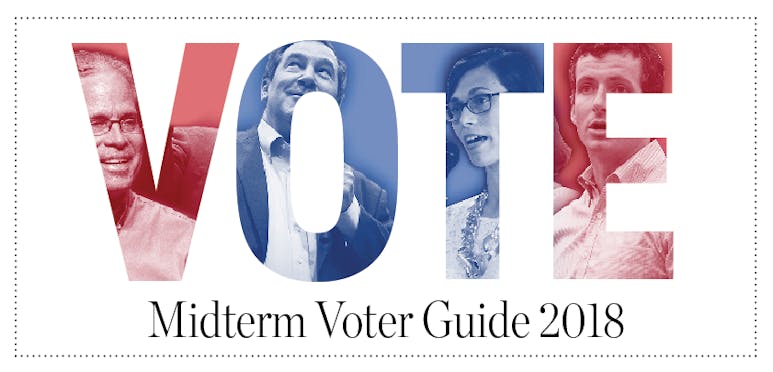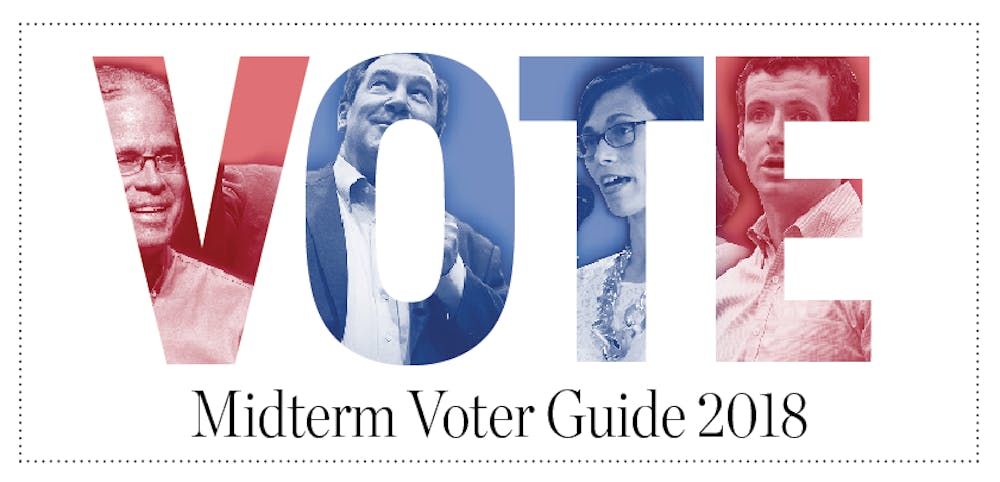
What are the midterm elections?
Midterm elections happen between presidential elections. Representatives from the House reach the end of their terms every two years, so all 435 representatives are up for re-election in midterms.
Some senators are also up for election during midterms if they are at the end of their six-year term. This year, 35 of 100 Senate races are being voted on.
The Indiana Senate race between Sen. Joe Donnelly and Republican candidate Mike Braun is among the closest watched in the nation in part because Donnelly is a Democrat in a state that went for President Trump in 2016.
Democrats need to win 28 seats Tuesday to win control of the Senate, while Republicans need nine.
State and local elections occur at midterms as well.
When can I vote?
8 a.m. - noon Monday
Monroe County Voter Registration Office
401 W. Seventh St.
6 a.m. - 6 p.m. Tuesday
Find your Indiana voting site at indianavoters.in.gov
What do I need?
An Indiana or U.S. government-issued photo ID with a name that conforms (doesn’t have to be identical) to your voter registration record and has an expiration date on or after Nov. 4, 2014. Your IU student ID can be used.
You can take this guide (in print or online) and any other literature with you into the polls to be an informed voter.

The incumbent senator is running for a second term in the Senate. Before the moderate Democrat’s election to the Senate in 2012, he represented Indiana’s 2nd District in the House for three terms. He received both a bachelor’s and law degree from the University of Notre Dame.
Health care Donnelly has made his vote in the Senate to preserve pieces of the Affordable Care Act central to his campaign. He has distanced himself from the Medicare-for-all policies proposed by his more liberal colleagues but frames health care as a defining issue of the campaign. He is opposed to the lawsuit Indiana joined, which is aimed at removing protections for pre-existing conditions.
Economy Donnelly’s campaign website touts his support for a NAFTA renegotiation, a position Trump also holds. Donnelly has not been in favor of the tariffs imposed on Chinese steel by the Trump administration.
Tax reform When the president announced the initial plan for an overhaul of the tax code in September 2017 in a speech in Indianapolis, he brought Donnelly along on Air Force One. Donnelly ended up not voting in favor of the tax bill, citing the lack of benefit to working class Hoosiers and its projected increase of the deficit.
Immigration Donnelly is one of the few Democrats who has publicly supported Trump’s border wall plan. Where he differs from his opponent is on his position toward enrollees of the Deferred Action for Childhood Arrivals policy, which the Trump administration moved to roll back last year.
Supreme Court The senator voted to confirm Justice Neil Gorsuch to the Supreme Court but voted against confirming the president’s second nominee, Justice Brett Kavanaugh, whose nomination was mired by allegations of sexual misconduct.

The Republican millionaire business owner from Jasper, Indiana, served in the Indiana House of Representatives for three years, resigning in 2017 to focus on his Senate bid. He has made his allegiance to the president central to his campaign. He completed undergraduate studies at Wabash College and received an MBA at Harvard University.
Health care Braun believes “the only option is to repeal and replace every word and regulation” of the Affordable Care Act, according to his campaign website. Though he has claimed support for pre-existing conditions coverage, he supports the lawsuit Indiana has joined, which is aimed at striking down those protections. A recent report in Politico detailed the costly health insurance his own company provided to employees.
Economy Braun acknowledged that tariffs can potentially have negative consequences when it comes to retaliatory measures, but eventually supported the president’s efforts to impose tariffs on Chinese steel.
Tax reform Braun supported the overhaul of the tax code and was also in the room when Trump announced the plan on Sept. 27, 2017, in Indianapolis. He believes the U.S. should “make the Trump tax cuts permanent and continue simplifying the tax code,” according to his campaign website.
Immigration Braun is in favor of Trump’s border wall and believes the federal government should cut funding for sanctuary cities. Like many of his Republican peers, he has paired issues of drugs and violence with immigration. He believes businesses should be required to check the immigration status of employees.
Supreme Court Braun said he would have voted to confirm Justice Brett Kavanaugh to the Supreme Court if he was in the Senate. He has used Donnelly’s vote against the confirmation as a point of criticism.
Other candidate: Lucy Brenton, Libertarian, believes the Libertarian approach, including limited federal government involvement, is the best way to deal with these issues.

Incumbent Trey Hollingsworth, R
The incumbent Republican is running for a second term representing Indiana’s 9th District. Originally from Tennessee, he moved to Indiana the month before he declared candidacy in 2015. The Jeffersonville businessman completed his undergraduate degree at the University of Pennsylvania and received a master’s degree from Georgetown University.
Health care Hollingsworth is in favor of repealing and replacing the Affordable Care Act. He also considers the government’s effort to regulate the health insurance industry overreach.
Economy When the Trump administration-backed tax bill passed, Hollingsworth said it would increase the number of available jobs.
Tax reform Hollingsworth voted to pass the Tax Cuts and Jobs Act. He is in favor of shrinking government and lowering taxes.
Immigration Hollingsworth opposed the resettlement of Syrian refugees when he first ran for Congress. He has told news media that he is in favor of increasing the thoroughness of the vetting process for immigrants.

The Bloomington native served as a labor policy director and chief labor counsel for the Democrats on the House Committee on Education and the Workforce. Watson is a labor rights attorney with a host of progressive and union endorsements under her belt. She attended Carleton College and received a law degree from Georgetown University.
Health care Watson is running on a Medicare-for-all platform, similar to that of Sen. Bernie Sanders, I-Vermont, who spoke at a rally in support of the 9th District candidate last month in Dunn Meadow.
Economy Watson supports raising the minimum wage and believes solutions to unemployment include making college attendance more affordable and investing in infrastructure.
Tax reform Watson is opposed to the recently passed tax bill.
Immigration If elected, Watson said she will push for passage of a DREAM Act, according to her campaign website. She believes Immigration and Customs Enforcement needs to be reformed and is opposed to a border wall.
Secretary of State
Incumbent Connie Lawson, R, has served as secretary of state since 2012. She has worked on increasing transparency and accountability in elections and to increase financial literacy throughout the state.
Jim Harper, D, currently practices law in Porter County. His main issues include ending gerrymandering, increasing voter accessibility, supporting small businesses and working to increase election security.
Mark Rutherford, L, has served on the Indiana Public Defender Commission since 2007. Rutherford believes in ending political redistricting and supports the reduction of fees and regulations of small business owners.
Auditor of state
Incumbent Tera Klutz, R, was appointed to the position by Gov. Eric Holcomb in January 2017. She is the first certified public accountant to hold the position and is focused on improving the financial integrity of the auditor’s office
Joselyn Whitticker, D, has served on the Marion Common Council from 2012-16 where she served as president in 2015. She wants to bring more transparency to the auditor’s office.
John Schick, L, served as secretary of the Libertarian Party’s state central committee for six years. His goal as auditor is to ensure the legislature and the electorate are informed of the effects on constitutionally-mandated spending, such as infrastructure and schools.
Treasurer of state
Incumbent Kelly Mitchell, R, was elected as treasurer in 2014. She wants to continue to bring a fiscally conservative approach to investment.
John Aguilera, D, served four terms as a state representative. If elected, he wants to implement responsible investment strategies and improve investment in infrastructure.
State representative, District 61 Matt Pierce
Judge of the Monroe Circuit Court, 10th Judicial Circuit, No. 2 Christine Talley Haseman
Judge of the Monroe Circuit Court, 10th Judicial Circuit, No. 3 Catherine Stafford
Judge of the Monroe Circuit Court, 10th Judicial Circuit, No. 8 Kevin Weldon, Darcie L. Fawcett
Prosecuting Attorney Erika Oliphant
Monroe County Circuit Court Clerk Nicole Browne, Jacob Franklin
Monroe County Recorder Eric Schmitz, Hal Turner
Monroe County Sheriff Brad Swain
Monroe County Assessor Judith A. Sharp
Monroe County Commissioner, District 1 Elizabeth "Lee" Jones, Larry D. Barker
Monroe County Council, District 1 Shelli Yoder, T. Ann Boehm
Monroe County Council, District 2 Kate Wiltz, Ann Collins
Monroe County Council, District 3 Ashley Pirani, Martha "Marty" Hawk
Monroe County Council, District 4 Eric Spoonmore
MCCSC Board, District 1 Eric James Breidenstein, Jane A Gouker, Thao Nelson, Elizabeth A Ruh
MCCSC Board, District 7 Brandon Shurr
MCCSC Board, District 3 Martha Street, Byron R Turner II
Shall Article 10, Section 5 of the Constitution of the State of Indiana be amended to require the General Assembly to adopt balanced budgets for state government that do not exceed estimated revenues unless a supermajority of two-thirds of the members of the House of Representatives and two-thirds of the members of the Senate vote to suspend the requirement?
Indiana Public Question 1 asks if the state should adopt a policy requiring legislators to make a balanced budget every two years, amending Article 10 Section 5 of Indiana’s constitution.
A balanced budget means spending will not exceed the state's revenue. The requirement can be suspended by a two-thirds vote from the Indiana House and Senate.
Voting yes means being in support of requiring the legislature to adopt a balanced budget. The amendment was also introduced to prevent court-ordered budgets from passing without legislative approval.
If the article is amended, pension amounts will be determined by actuaries' calculations. However, pension accounts have been actuarially funded for years, according to the Indiana Public Retirement System, which is in charge of pension funds for Indiana.
Beth Cate, clinical associate law professor at IU, said opponents of the bill are against it because Indiana has little record of going above the budget and the amendment is uncalled for. However, the Department for Child Services went over budget by $284 million in 2018.
When that occurred, the DCS was given $125 million for the fiscal year 2018. A press statement from the DCS said a surplus could be diverted to the department if needed.
Proponents for the amendment argue that despite Indiana being fiscally conservative, writing the amendment into the constitution is a precautionary action, Cate said.




